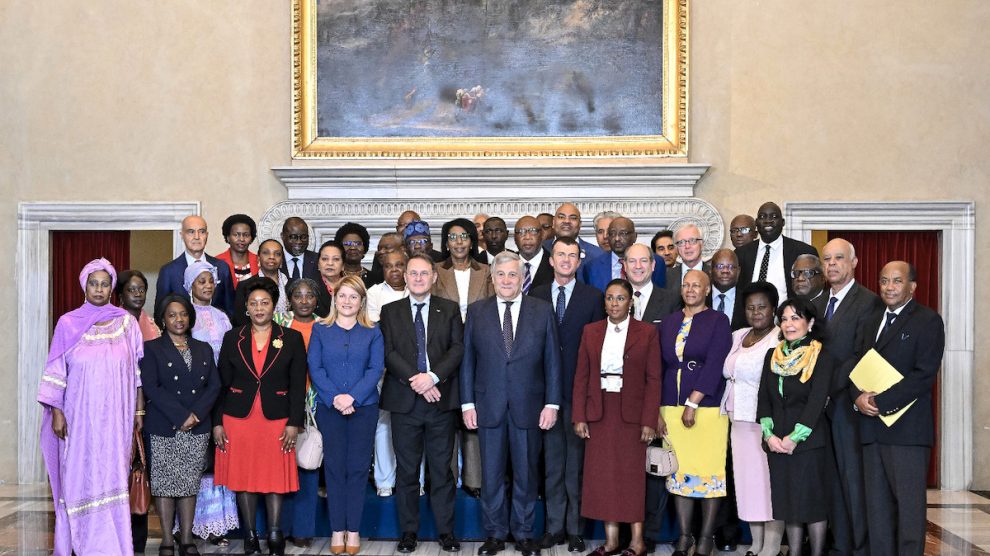How Italy looks to Africa. On Monday, during a meeting with the ambassadors of several African countries in Rome, Foreign Minister Antonio Tajani stressed that the continent is “of prime importance for our foreign policy.” The Italian government intends to “achieve an increasingly solid partnership, a fundamental prerequisite for tackling together the many global challenges that inextricably bind the two shores of the Mediterranean.”
Two words: Mattei Plan. FM Tajani announced the fourth edition of the Italy-Africa Conference – a forum for high-level political dialogue with African countries and a functional tool for promoting relations with them – will be held in Rome next autumn, on a date that’s yet to be determined.
- That’s when the executive will present what it calls the Mattei Plan, which envisions turning Italy into a transition-proof energy bridge by developing infrastructure and investing (non-exploitatively) into partner countries to promote local green power production.
- Prime Minister Giorgia Meloni has been touting the project since before she was elected in September 2022, arousing interest and attention on the African continent and among international players who are interested in it.
The European link. This plan will reportedly set out to create a “virtuous model” based on shared growth, through forms of collaboration in the energy sector and beyond, and in close connection with the European Global Gateway project – the EU’s plan to become a key player in Africa amidst the great power competition shaping the continent’s dynamics.
- The Mattei Plan will thus become the tool through which Rome may project its foreign policy, join it with that of Brussels and become a central actor in Africa – where demographic, and therefore economic, growth will turn it into one of the great geostrategic quadrants of the future.
From the horse’s mouth. “We want to get all of Europe involved in action toward Africa. If we want to solve the problem of immigration and terrorism, we have to invest as all of Europe. If China and Russia do it, we risk clashing with divergent and often colonialist interests,” remarked FM Tajani, picturing the Mattei Plan as part of a “great European Marshall Plan” for Africa.
- The Meloni government intends to lead the process of bridging European and African interests; it demonstrated this by ramping up its diplomatic activism and having senior executive officials, including PM Meloni and FM Tajani, engage in talks and official visits with their counterparts on the continent over the past months.
Trade and education. During the meeting, FM Tajani expressed his willingness to continue strengthening continental economic and trade integration, focusing on employment creation and business and technological capacity building. These activities also mark European programmes and are linked to Italy’s commitment to invest in primary and university education, as well as innovative vocational training pathways that put young Africans – the predominant demographic class on the continent – in a position to actively participate in the region’s future, “removing them from the fate of irregular immigration or, worse, the lure of terrorism or crime.”
The migration overlap… On the shorter term, Italy also looks to Africa through the lens of the migration challenge, a key concern for all parties in the governing coalition – especially now that landings are increasing significantly. That’s also why Rome intends to foster African development, as greater economic growth would prevent the triggering of emigration waves.
… and the strengths of Rome’s position. The Italian presence could be a balancing element that could build trust and benefit bilateral and multilateral activities. Not least because, as one regional source reported, “Italians are very well regarded in Africa – unlike so many others.”
- That “others” has a broad value, as it covers both European countries that have been very present in the country – but weren’t exactly absorbed by local governments and communities – as well as other international players whose interest is read by Africans as a mere positioning in the competition between powers – which, in turn, risks transforming the continent once again into a terrain of conquest and exploitation.
- Local populations, which have acquired higher levels of political and social awareness, staunchly reject this approach, even though the phenomena of instability are spreading rapidly throughout Africa – perhaps also in connection to destabilising activities on behalf of actors revealed by Italy and Europe.




